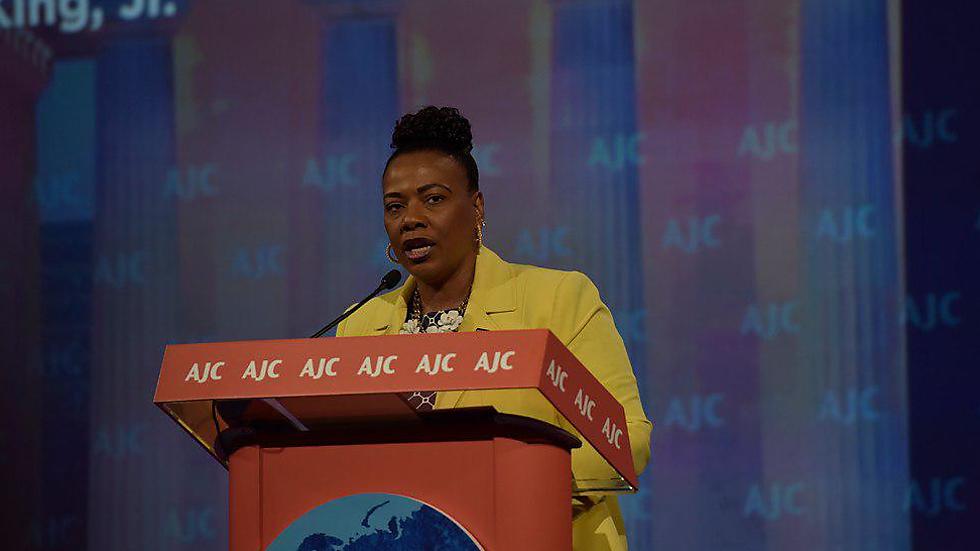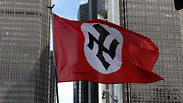
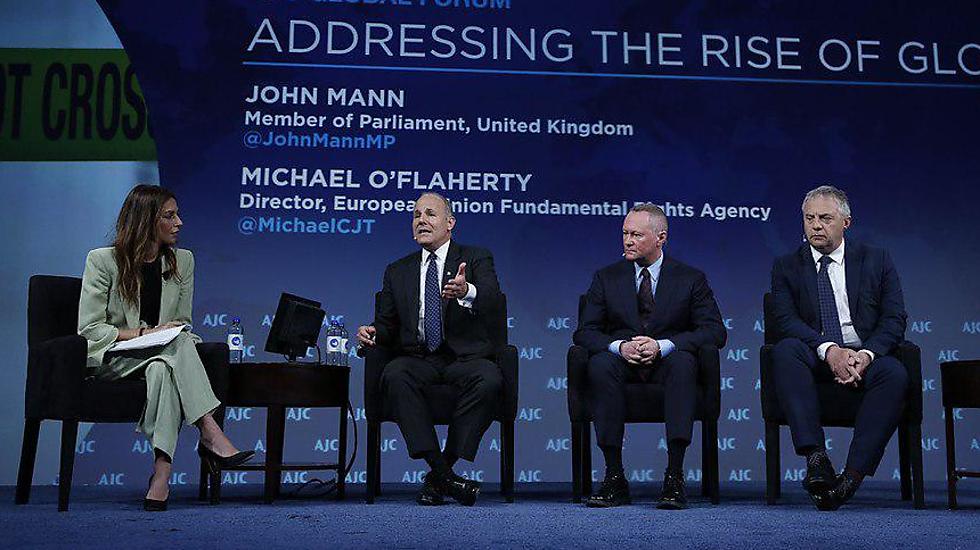
Specter of anti-Semitism weighs heavy on American Jews
American Jewish Committee conference discusses communities outside Israel, with participation from Jewish leaders and other religious communities, as well as from activists and politicians from U.S. and Europe; the depressing conclusion: Spread of anti-Semitism is bad, it's getting worse
Early one morning earlier this month, photos of American neo-Nazis with shaven heads and carrying torches were displayed on the enormous screen of the grand ballroom in the Hilton Hotel in Washington, D.C.
With threatening voice-over in the background, photos rotated on the screen between the American neo-Nazis and European anti-Semites, holding signs and flags and the rest of their hateful paraphernalia.
The captions that accompanied the photos matched the embattled atmosphere emanating from the images, the voice-over and even the music. The whole scene rang like a warning siren. And filled with fear, I stared at the screen.
On June 9 in the American capital, 2,500 people attended the annual conference of the AJC. It is the oldest Jewish organization in the U.S., and prides itself on being "the Foreign Ministry of the Jewish people."
They too stared at the photos that flickered on the screen, inhaled deeply, and even clicked their tongues in despair when witnessing the worst scenes. If the point of the video was to frighten the attendees, it was successful.
'Everything gets mixed up'
When the music died down, a young bearded man came up onto the stage, well-dressed if a little unkempt. Without greeting us, he began to talk about anti-Semitism in France.
We were not allowed to photograph or record him, because he is an active member in a Jewish security organization that has been working to protect French Jews for several years, and one that on occasion also avenges them after humiliating and harmful incidents.
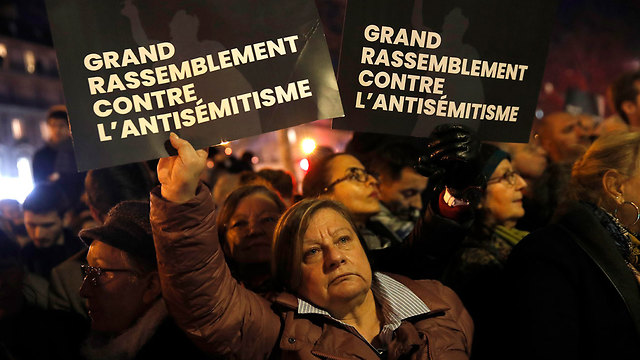
The young Frenchman reported on the growing threats in his country, on the lax response of French authorities, and on the killings of innocent Jews like Ilan Halimi in 2006 and Mireille K. in 2018.
"You get the impression that Jews are very worried about what is happening in the US and in Europe," I told one of the senior members of the AJC at the break. He nodded in agreement.
"There's a problem," he said. "Not only in the US. Antisemitism exists, but the problem is that everything gets mixed up: antisemitism, nationalism, Trumpism, populism. It's not a good situation."
The conference repeatedly communicated the message that the time has come to work against a common enemy that spreads hate and racism. Together, cried and promised the many speakers, we will fight antisemitism. Politicians from both sides of the aisle committed to fight with all their strength against the alarming trend.
Religious leaders call for love
Respected veteran AJC leader David Harris also spoke for a long time from his heart, without any notes, about the great aid his organization gave to those in need around the world, and also to those who experienced violence and hate in the U.S. One example was the Muslims in the former Yugoslavia who were massacred by the forces of Slobodan Milošević.
"Our heart grieved when the mosque next to the Twin Towers was damaged in that terrible attack," said Harris. "We immediately promised not to abandon them."
His words were moving. He wanted everyone to know that the Jews were part of the American social fabric.
A day before, the daughter of Dr. Martin Luther King Jr. stood on the same stage. Dr. Bernice King runs the center named after her father, and she too can leave a strong impression on her listeners. She quoted frequently from her father's speeches while speaking about equality and freedom.
"Love," said her father in one of his speeches, "is the only solution to the world's ills."
In a world of polarization and hate, of anti-Semitism and the racism that are raising their heads, Bernice King spoke of love. The audience indeed loved her and lauded her with a standing ovation.
Later, leaders from all religions and denominations came up to the stage to read together a kind of social contract they had written, and exhibited unity and cooperate against malice. Thank you, America.
Shaky sense of personal safety
Between the speech and the panel, I grabbed Ken Bandler, the AJC spokesperson, in the hotel's noisy bar.
While drinking a cold beer (my choice) and a ginger ale (his), I tried to understand how much of the drama was real, and how much anti-Semitism has become an existential problem for American Jews.
"The situation isn't that bad," said Bandler, surprising me. "Yes, there have been terrifying anti-Semitic events, but there have also been some in the past. In any case, the situation isn't pleasant and it's not good, and therefore we are focusing on the subject, and really highlighting it."
AJC director, Lt. Col. (res.) Avital Leibovich, who was long-term stalwart in the IDF's Spokespersons Unit, was less diplomatic.
"The conference this year reflected the situation of American Jews," she said. "In the last year, anti-Semitic incidents multiplied and then peaked with the murder of 11 Jews in a Pittsburgh synagogue. That event was without precedent in American history. Today, like in Europe, most Jewish organizations have armed guards, but the sense of personal safety has been shaken in the last few years."
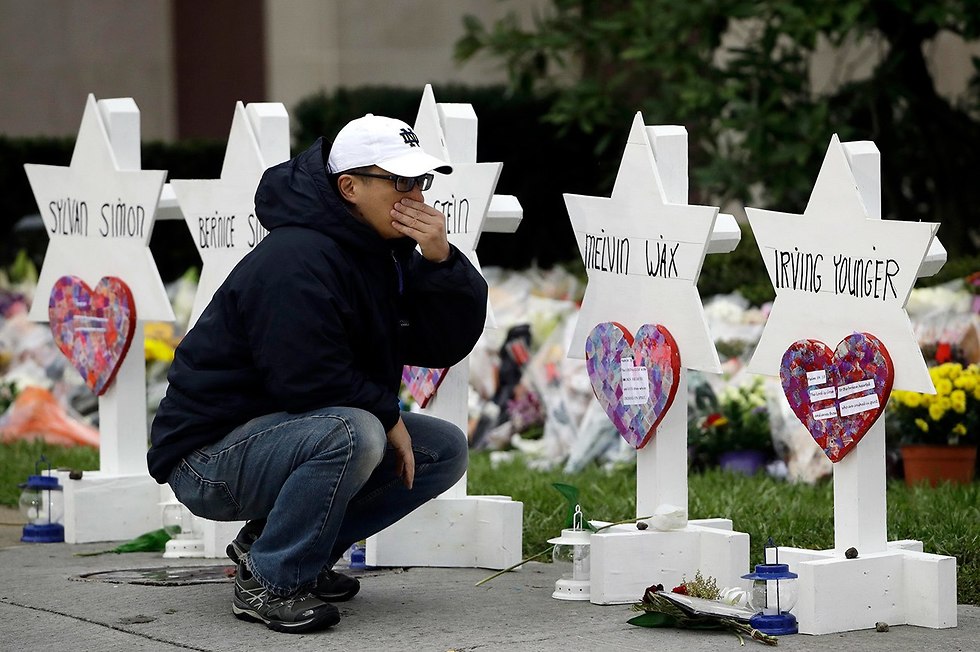
It is not only in America. At one of the main panels at the conference, a representative of one of Europe's human rights organizations warned that Europe is sinking in hideous anti-Semitism, and that the continent isn't even certain how big the swamp really is.
"We don't see a national commitment to turn the campaign against anti-Ssemitism into a central subject in many places," said Michael O'Flaherty, the director of European Union Agency for Fundamental Rights (FRA).
"The situation is bad, and it's getting worse. Eighty percent of cases aren't reported. That means that official reports don't accurately represent reality. People are saying, why report anti-Semitism to an anti-Semite. It's nauseating that in some countries, the government demands payment from Jewish communities for increased security."
Anti-Semitism in the western world has become a subject that is reported in the Israeli media, but the Jewish Agency says that the Israeli public doesn't really relate to the stories and reports coming from distant communities.
This is not the fault of Israel's citizens of course. Israelis deal every day with security threats at home, so sporadic events that occur far from the country's borders do not pass the mental barriers with which most Israelis insulate themselves.
Yet recent AJC surveys showed that 65% of Jews feel less safe in their country than the year before. In addition, 57% reported that the atmosphere on campuses has become more hostile to Jewish students.
The upshot is that the anti-Semitic incidences, like the killings in Pittsburgh and San Diego, are weighing heavily on Jewish life in the U.S. That was reflected at the conference.
This situation is of course represented in the statistics of the recent survey. Despite the growing antisemitism, 75% of Jews in the US believe that there is a future for Jews in Europe.
With respect to Israel, most Jews are concerned for the country and 62% reported that caring for Israel is an important part of their Jewish identity.
Incidentally, 59% believe that being Jewish is a cultural and national matter, while only 24% see it as a religious matter.
The writer was a guest at the AJC Annual Conference in Washington, and participated in a panel on Israeli politics with other Israeli journalists.















